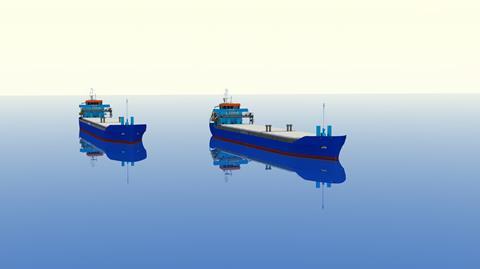Finland’s Meriaura has signed contracts with the Dutch shipyard Royal Bodewes for two EcoTrader cargo ships. The vessels will be built in the Netherlands and will be delivered in January and December 2026, respectively.

The EcoTraders are 105 m long, 1A ice-classed 6,750 dwt vessels. Like the carrier’s EcoCoaster vessels Eeva VG and Mirva VG delivered in 2016, the new EcoTraders can be operated with biofuel made from recycled raw material produced by Meriaura’s subsidiary VG-Ecofuel. The newbuilds will be approximately 30 percent larger than the EcoCoasters.
Meriaura said that this order affirms its commitment to energy-efficient tonnage that utilises bio-oil and that in the current geopolitical situation, the company found it best to order ships from an established shipyard in Western Europe. “Building in Europe is also in line with our ESG strategy. Security of delivery and timing, quality and the yard’s ability to comply with safety and environmental regulations, and our good experience with the previous newbuildings were the most important factors in our decision to choose Royal Bodewes as our shipbuilder again,” said Beppe Rosin, ceo at Meriaura.
The contract value is approximately EUR34 million (USD36.1 million). 20 percent of the vessel investment is self-financed, and 80 percent is financed with external capital.
“Our two newly ordered vessels mark the beginning of a newbuilding programme through which Meriaura aims to achieve carbon neutrality significantly faster than the IMO target. Our goal is to systematically renew our fleet with a series of newbuildings. The use of bio-oil combined with compensation enables us to achieve our ambitious target,” said Jussi Mälkiä, founder of Meriaura and chairman of the board of directors.
On April 15, HLPFI reported that Meriaura transported offshore template structures for Subsea7 using its CO2 emissions reducing Eco Voy-transport concept. The templates, which form part of the Skarv Satellites project for Aker BP, were transported from Gdansk, Poland, to Sandnessjoen, Norway, onboard Meriaura’s deck cargo carrier Meri. The sea transport utilised a 50 percent fuel mixture of MGO and biofuel, which halved the CO2 emissions for the transport compared to emissions when using only fossil fuels.
















